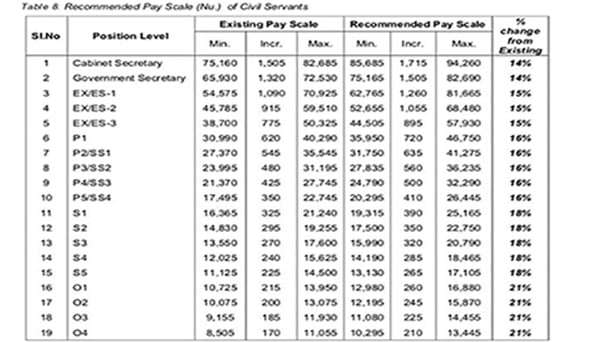 The fourth Pay Commission recommends a revision of basic pay of public servants ranging from 14 per cent to 29 per cent with the higher rate of revision at the lower position. The commission released its report on the salary, allowances and benefits for civil servants and other relevant public servants yesterday.
The fourth Pay Commission recommends a revision of basic pay of public servants ranging from 14 per cent to 29 per cent with the higher rate of revision at the lower position. The commission released its report on the salary, allowances and benefits for civil servants and other relevant public servants yesterday.
The cabinet is currently reviewing the report. The report will be submitted to the parliament for deliberation.
Revision for cabinet and government secretaries is at 14 per cent, for executive and specialist level or EX-level 15 per cent, 16 per cent for professional and management or P-level, 18 per cent for supervisory and support or S-level and 21 per cent for operational or O-level.
The commission proposes a revision of 14 per cent for Cabinet Ministers, Deputy Speaker of National Assembly and Deputy Chairperson of National Council, Members of Parliament, Chairperson of ACC and RCSC, Chief Election Commissioner of ECB, Auditor General of RAA, Drangpoens of Supreme Court and High court, Chief Justice of High Court and Supreme Court and the Commissioners or members of constitutional offices.
The pay scale of the local government functionaries was revised by 40 per cent in 2017 except for Thrompons of the four thromdes. The commission recommends the revision of pay of the Thrompons by 25 per cent.
 The pay revision of RAPA and Para regular is mapped with the equivalent positions in the civil service from 16 per cent to 21 per cent. The pay scale of NFE instructor is recommended to be revised from Nu 8,400 to Nu 10,270, which is an increase of 29 per cent.
The pay revision of RAPA and Para regular is mapped with the equivalent positions in the civil service from 16 per cent to 21 per cent. The pay scale of NFE instructor is recommended to be revised from Nu 8,400 to Nu 10,270, which is an increase of 29 per cent.
The pay scale of Gyadrung is recommended to be revised by 18 per cent.
To promote meritocracy and excellence and reduce the cost of public service delivery, the commission recommends introducing performance-based incentives.
Regarding allowances, the report recommends revising allowance for the recipients of Red Kabney from Nu 100 to Nu 10,000 per month for all serving and retired.
The commission recommends enhancing the PF contribution of the government from 11 per cent to 18 per cent in order to ensure that members receive adequate retirement benefits. It also recommends lifting the maximum ceiling of Nu 1.5 M to encourage public servants to serve longer and to enhance their post-retirement benefits.
And in recognition of the crucial need of professionals in health and education, the commission recommends the revision and introduction of allowances in these sectors.
The introduction of allowances for on-call duty for doctors, night duty allowances for health professionals is included. Revision of radiation allowance for radiology technicians and the introduction of critical care allowances is also proposed.
The commission suggests revising teaching allowance to 20 per cent of the recommended minimum pay scale in each position level irrespective of the number of years served by the teacher.
The house rent allowance has been reviewed and considered at 20 per cent of the recommended revised pay for public servants, 30 per cent for term-based appointments and members of parliament. This increases the house rent allowance for cabinet and government secretaries by 71 per cent while 21 and less than 21 per cent for the rest.
The existing driver allowance for members of parliament is recommended to be revised from Nu 6,000 to 10, 000 per month respectively.
As per the commission’s report, the net annual implication of the recommended pay revision, allowances and benefits is estimated at Nu 4.238 bn, an increase of about 30 per cent from the existing pay and allowances expenditure. The financial implication over the next four years is about Nu 17.9bn which is within the fiscal space of the 12th FYP outlay.
The commission recommends implementation of pay, allowances and benefits with effect from 1st July this year.





